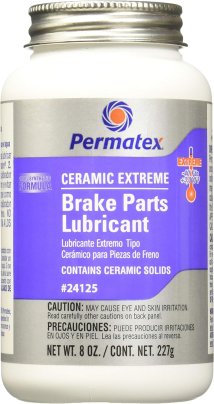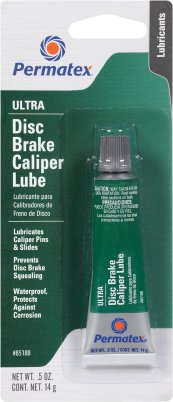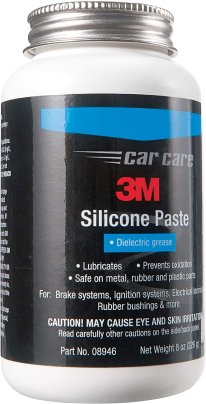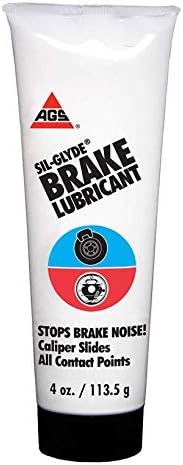We may earn revenue from the products available on this page and participate in affiliate programs. Learn more ›
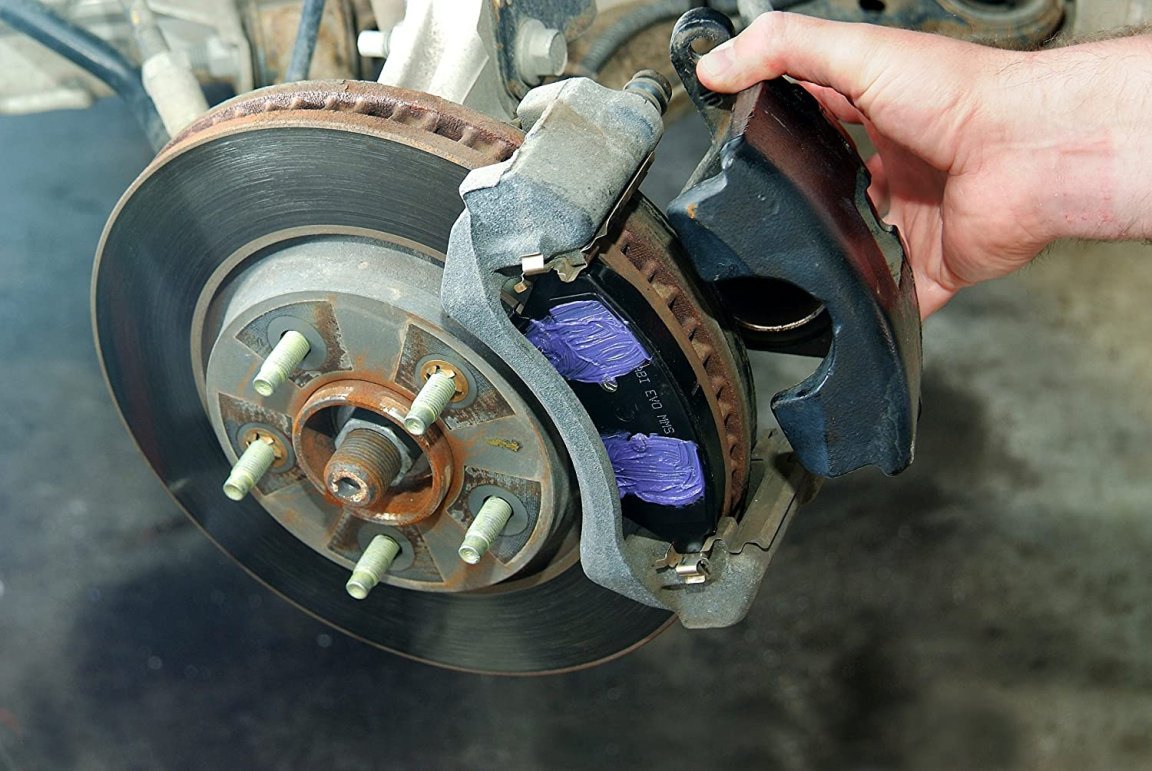
Your car is filled with important components, and each one is critical for driving. But there’s a solid argument for brakes being the most important. Whether you’re driving on the open highway or sitting in stop-and-go traffic, your brakes are one of the features you rely on most. Without you even thinking about it, your brakes work hard. Every time you step on the brakes, they’re using friction to slow and stop your vehicle. And with many moving parts involved in brakes working effectively, over time your car’s brake system can require lubrication — and the right kind of lubricant.
Lubrication helps your brakes function smoothly and properly, helping to reduce wear and tear over years of driving. It can also prevent or stop squealing, screeching, or other noises from happening when you step on your brakes. But lubricating your brakes doesn’t mean you can simply slather any kind of grease or oil onto these important mechanical parts. You need the right kind of lubricant, one that can better and benefit your brakes. If you’re looking for a quality brake lubricant, check out the following top products.
Why Do Your Brakes Need Specialty Grease?
Your brakes experience extreme amounts of heat and pressure while you drive. This means you need a grease that can withstand the more aggressive environment. A general-purpose grease will shear or evaporate off from the pressure. Then the extreme heat could cause it to melt off.
You also need to consider that some of your brake components are made out of rubber or plastic. You can’t use a lubricant that will cause these parts to corrode or get damaged in any way. Special brake lubricant doesn’t have harsh formulas, so all of your brake components can stay in working condition.
Benefits of Brake Lubricant
- Smoother. Lubrication on your brakes keeps everything moving smoothly against each other. Without it, your brake components won’t glide, which will cause them to wear unevenly. Over time, the uneven surfaces will create vibrations that will emanate throughout the vehicle.
- Quieter. The brake components need to be lubricated to move smoothly and not grind or catch on each other. Without the lubricant, the components grind and this creates a loud squealing or screeching noise.
- Longer useful life. When your brake components move smoothly, they experience less wear and tear. This means you can use them for longer. This will save you money in the long run.
What Components Should You Lubricate?
How you lubricate your brakes will depend on what type of brakes you have. Drum brakes need lubrication on the backing plate, the adjustable star-wheel, the parking brake cable, separator, and any metal-to-metal contact between moving parts. Do not lubricate the inside of the drum! This will cause your brakes to stop working.
If you have disc brakes, the idea is similar; lubricate the metal-on-metal moving parts. There are small screws on the top and bottom of the brake caliper that hold it in place that should be lubricated. There is also a bushing that moves the caliper that needs lubricating. Similar to the inside of the drum, do not lubricate the inside of the brake rotors or pads. This will cause your brakes to fail.
Types of Brake Lubricants
Silicone
Silicone is a smart grease choice because it’s safe for use with plastic and rubber. It will also create a protective barrier on metal to help prevent corrosion. This type of lubricant is made from a silica compound that’s been thickened. You’ll need to be careful when using silicone because it can get contaminated with organic solvents.
Synthetic
The modern innovation of grease is synthetics. They outperform conventional grease in both heat, lubrication, and longevity. You’ll find that they are more resilient when it comes to resisting degradation in extreme environments. Using a synthetic means you can go longer between your greasings, such as from monthly to quarterly.
Anti-Seize
This type of brake grease has an extremely high temperature tolerance. It’s made of nickel and has a thicker consistency than typical grease. The thicker consistency helps it to stick to the pads without burning or rinsing off. Be sure to choose an anti-seize that is compatible with the type of metal that you’re applying it to.
Top Brands
3M
The 3M brand is one of the most well-known brands in America. Founded in 1902 and a mining firm, the company now produces more than 6,000 products for worldwide distribution. Its headquarters are located in Maplewood, Minnesota. The Permatex 24129 Silicone Extreme Brake Parts Lubricant is a reliable and long-lasting grease.
CRC
Based in Pennsylvania, CRC manufactures chemically-formulated products for the automotive and marine industries. Since its founding in 1958, the company has grown to have well over a thousand products that it sells worldwide. Consider trying out the CRC 05359 Brake Caliper Synthetic Grease for lubricating the brakes.
Permatex
Founded in 1909, the Permatex brand has been a leader in the automotive care market. Among its broad line of products are lubricants. The company has its headquarters in Ohio, but it also operates offices around the world. For a high-quality product, consider the Permatex 09128 Copper Anti-Seize Lubricant.
Brake Lubricant Pricing
- Under $20: This price range will get you a small container of lubricant. High-quality lubricants will be in smaller containers of eight ounces or less. Lower-quality lubricants will be in larger containers.
- $20 to $40: You may find that spending in this range will get you a better-quality lubricant that can withstand more extreme temperature variations or strong pounds of pressure. There are also mid-range quality lubricants that are in larger containers.
- $40 and up: If you’re looking to spend this amount, you’re going to buy a large container of lubricant. You may also find smaller containers that come in multi-packs.
Key Features
Temperature Resistance
The brakes on your vehicle can get extremely hot. The harder and faster your drive and the harder you brake, the hotter your brakes will get. You need a lubricant that can withstand this heat and pressure. You also need a lubricant that can withstand cold winter temperatures when your car is parked. Look for a lubricant with a wide temperature range so that it won’t melt or freeze.
Viscosity
This is how liquid or solid a lubricant is. You need to choose a brake lubricant with a high viscosity so that it will stay put. A lubricant with low viscosity will be too fluid and will drip or run and end up where you don’t want it. The longer your lubricant stays in place, the longer it will protect your brake parts.
Application
Application can mean two things; the first is how you put the grease where you want it. Lubricants can get messy quickly, so a neat application will ensure you only get it where you want it. Some lubricants come in a squeeze tube. Others come in a jar with an included brush.
The other definition of application refers to the intended use of the lubricant. You should only use a brake lubricant that’s meant for the materials that your brake components are made out of. Some lubricants are not compatible with rubber and plastic.
Other Considerations
- Thickeners. Your lubricant needs to have a thickener in it to help the particles stay contained and evenly suspended in the formula. The thickener also helps bind the particles to the oil. This holds the lubricant exactly where you apply it. The most common thickener used to make grease is lithium.
- Water Resistance. If a grease is water soluble, then it will eventually wash off when exposed to water. This isn’t good and will require you to relubricate more often. Lubricant that is water-resistant will protect your brake parts better and last longer. It will create a solid seal that water can’t penetrate.
- Additives. Some lubricants have special ingredients added to the formula. These additives give the lubricant special qualities for specific applications. The additive will improve the function of the lubricant. They could provide greater wear protection, strong corrosion resistance, and prevent rust. You won’t necessarily need a lubricant with an additive unless you have a specific concern.
Most Versatile
AGS SIL-Glyde Silicone Based Brake Assembly Lubricant
Check Latest PriceTips
- Confirm the correct amount of grease you need. Not enough won’t lubricate well, and too much will ooze out everywhere.
- If you have a lot of grit and dirt that you’re cleaning out of your brakes, then you should clean and lubricate the parts. The grit can get caught in the lubricant and create problems.
- Brake pads can last two to three years, depending on their quality and how you drive. If you keep the parts well-lubricated, it will ensure the other parts don’t wear out before their time.
FAQs
It is absolutely necessary because it helps to keep your brakes working properly. Skipping the lubricant can cause your brakes to stop working entirely. Before they fail, you’ll experience strong vibrations and loud squealing when you apply the brakes. You also risk the temperature rising too high from the friction and warping the brake components.
Using Vaseline for your brake lubricant is a terrible idea. First, it does not have the temperature range of resilience that you need. This means it will quickly melt right off. When it melts, it can drip into places that you don’t want it and leave the places where you do. Vaseline is also made from petroleum jelly. This can cause it to destroy your rubber and plastic parts.
Yes, you should. This will help you get everything aligned in the right position. Do not grease the front of the brake pad, though.
This depends on what part of your brakes are squeaking. If your brakes are new and they’re squeaking, then you probably didn’t lubricate the parts well enough. If your brakes are older, then you need to be sure that it’s a lubricant squeak and not a worn-out squeak. Brake pads squeal when they’re well-worn and need changing; this is not a sign you need more lubricant.
Final Thoughts
The best lubricant overall is the Permatex Ceramic Extreme Brake Parts Lubricant because it’s easy to apply and a high-quality formula. For a more affordable option, the Permatex Ultra Disc Brake Caliper Lube is a smart choice.
